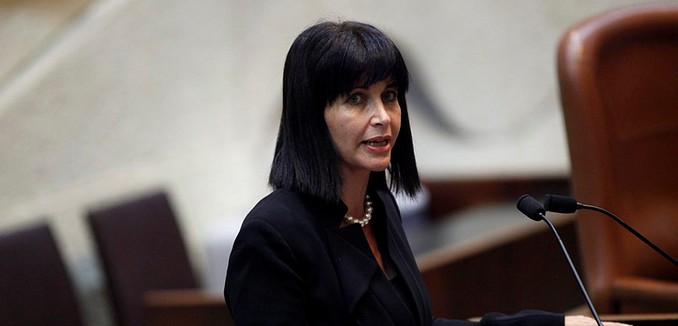Before peace can be achieved, Palestinians must recognize that Jews, like Arabs, have a right to exercise self-determination in their homeland, and drop demands for a “right of return” that would undermine a two-state solution, former Knesset member Einat Wilf wrote in an op-ed published in Haaretz on Thursday.
Wilf, who identifies as a member of the Zionist Left in Israel, argued that the dominant Palestinian narrative falsely regards Jews as an “invented” people who “have some unclear entitlement to self-determination in Arab Palestine, and it does not matter if it’s over 17% of the area west of the Jordan River (the Peel plan), 55% (the partition plan), 78% (the 1967 boundaries) or 100%.”
“The Palestinian national movement remains committed to the idea of liberating all of Palestine, from the sea to the Jordan River. There is no sign that it and its leaders are prepared to recognize that the Jewish people, as a people, have an equal right to self-determination in this land, which is its birthplace too,” she observed.
Wilf explained that the continued Palestinian demand for an illusory “right of return” to Israel, which purportedly applies even to “fourth-generation offspring of refugees living in Ramallah,” is a product of the Palestinian refusal to accept that Jews have a right of self-determination in their homeland — the very reason why Arab leaders rejected the idea of a two state-solution before Israel’s founding and instead sent their armies to invade the Jewish state the day after it declared independence.
“Holding onto the ‘right of return’ enables the Palestinians to continue to believe that even if they lose a battle, the war isn’t over,” Wilf wrote. “And if the war isn’t over,” Palestinians can still dream of defeating Israel by turning it into an Arab-majority state via the “right of return,” which is broadly supported by Palestinians. For peace to ensue, Wilf argued, Palestinians must instead recognize the legitimacy of Jewish claims to a state and, consequently, of the need to divide the land between the two peoples who call it home.
Palestinians must “acknowledge that they aren’t going to get the whole of Palestine,” she continued. Israeli Zionists, whether ideologically left-wing or right-wing, “insist on our right to self-determination in our homeland,” she concluded. “Our right is not exclusive and is not supreme, but as long as the Palestinian nationalist movement denies it, we will seek its defeat. And then we will make peace.”
In Towards a Zionism of Inclusion, which was published in the September 2014 issue of The Tower Magazine, Wilf explored the clash between Palestinian nationalism and Zionism in the context of Israeli Muslim identity.
As a result, for many Israeli Muslims, the only path to full inclusion and belonging is an end to Zionism. In the current situation, this is somewhat understandable. If Zionism and Palestinian nationalism are in direct conflict, the embrace of one naturally implies the rejection of the other. But it is also, of course, impossible for Zionism to accept, since it demands not the rewriting of the Zionist story, but the burning of the book itself.
As a result, the inclusion of Israeli Muslims in the Zionist narrative is likely to happen under one of two extreme conditions: Full peace between Israel and the Arab world, or an Arab world so engulfed in chaos and brutality that Israeli Muslims distance themselves from an Arab Palestinian national identity in search of an alternative. Under one of these extreme but not impossible scenarios, Israeli Muslims would no longer be Arab Palestinian nationalists, but Israelis and Zionists.
[Photo: Miriam Alster / FLASH90 ]




